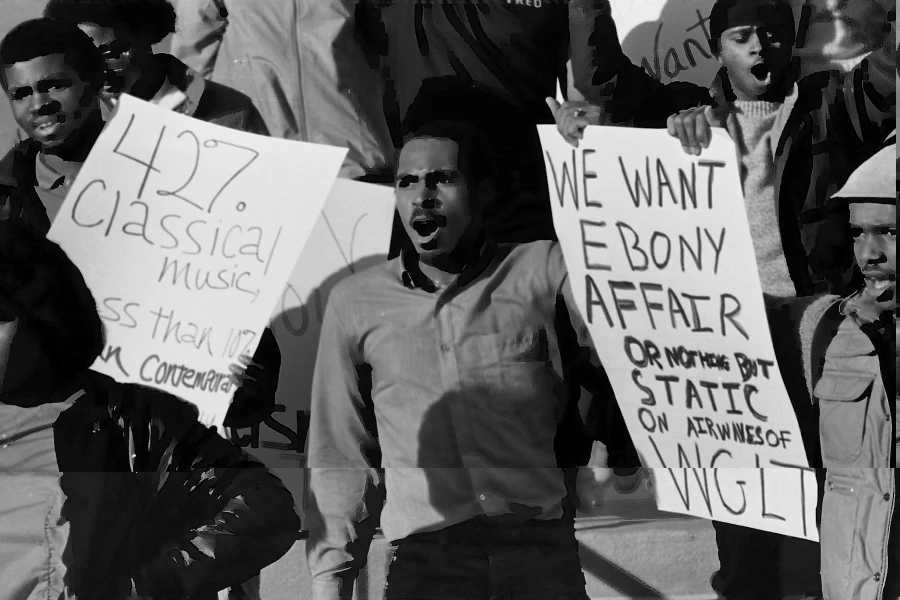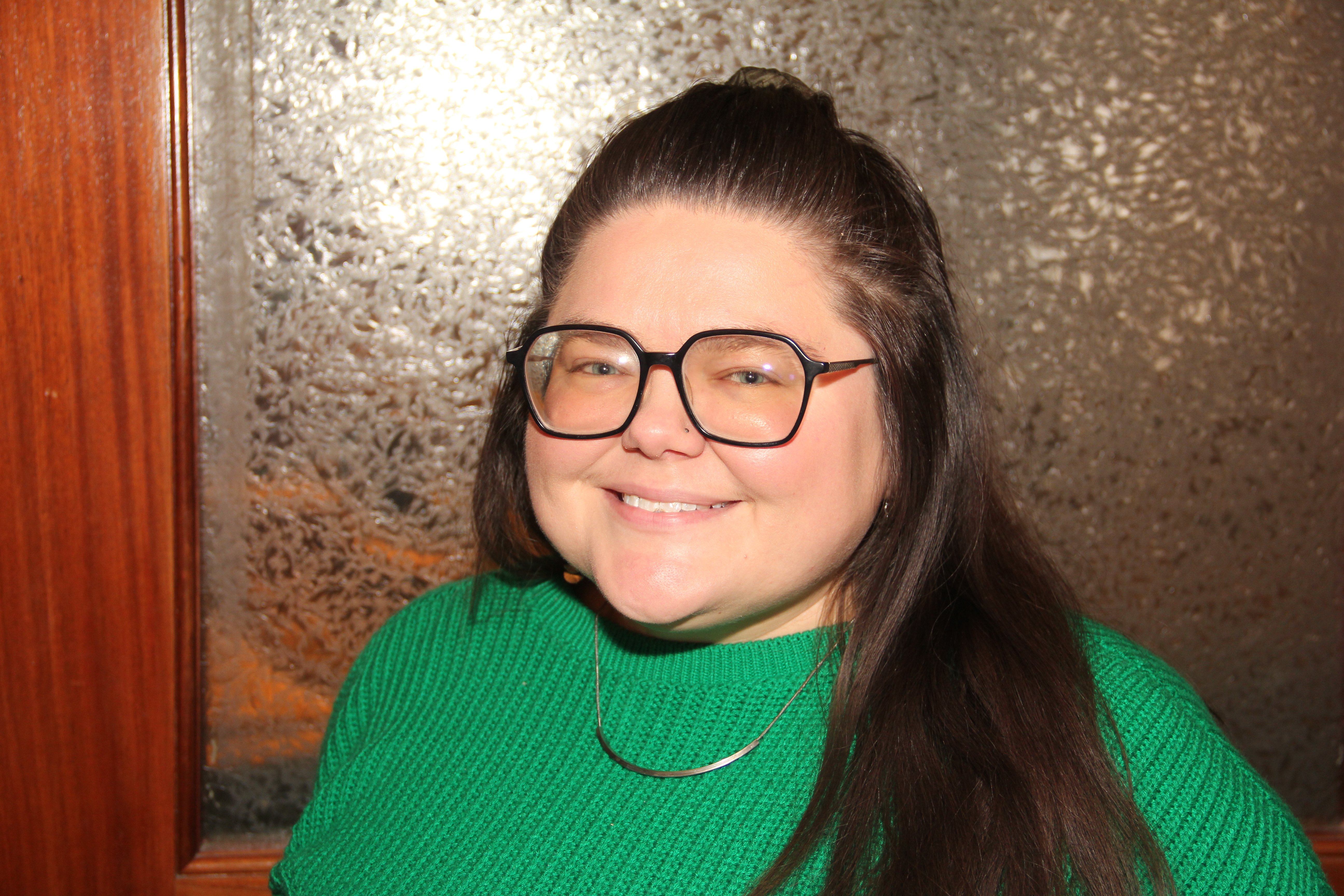This story is from the Museum’s weekly Sunday Pantagraph column Pieces from Our Past.
In 1969, "Ebony Affair" brought Black culture onto the airwaves of Bloomington-Normal by way of WGLT, the public radio station headquartered on Illinois State University's campus.
Every Monday through Thursday, from 10 p.m. to 1 a.m., the program featured "urban contemporary music" and segments exploring elements of Black culture.
The radio program became a vital space for Black expression. Student DJs played music by Black artists, discussed current events, and advocated for people of color not only on campus, but across the community.
However, not everyone supported the program's place on WGLT's lineup.
In 1979, the Pantagraph reported that WGLT canceled "Ebony Affair," citing content-related concerns. Station Manager Ben Paxton and Program Supervisor Bob Nicklas argued that the show's music selection overlapped too closely with what was already on commercial Top 40 stations. As a non-commercial station, WGLT aimed to distinguish itself from commercial competitors rather than compete with them.
Additionally, the station noted that Clive McBride, one of the show's DJs, was not a student, and WGLT's budget allowed for paid student workers but not a non-student host. McBride [no relation to WGLT's current station manager RC McBride] pushed back against Paxton's claim that the program closely resembled Top 40 content, emphasizing that he made a concerted effort to showcase lesser-known Black performers. He also disputed assertions that the show primarily attracted teenage listeners, noting that a large portion of callers were adults and a local barbershop with a predominantly older clientele often played "Ebony Affair."
The initial decision to pull the program sparked significant backlash, and public support for the show led to a swift reinstatement. Just weeks after its cancellation, "Ebony Affair" returned to the air on September 20, 1979, now headed by student DJ Cardell Purdie.
Alongside Purdie, Mass Communications instructor Dwight Brooks and ISU senior Joe Davis led the Ebony Affair into a new decade, expanding the show's utility into a valuable hands-on learning opportunity for students interested in broadcast journalism. A 1980 Pantagraph article also reported that "Ebony Affair" collaborated with Bloomington's Human Relations Commission to air "Inside Bloomington-Normal," a segment covering issues affecting the local Black and Hispanic communities.
However, in September 1983, WGLT announced sweeping program changes aimed at broadening its audience. As part of this restructuring, "Ebony Affair" was moved to Saturday evenings from 8 p.m. to 1 a.m., significantly reducing its airtime. Additionally, station leadership sought to rename the program to give it what they considered to be a broader appeal. Many saw this move as a de facto cancellation of the show, which was particularly surprising given the program's success.
Following WGLT's 1983 decision, the entire "Ebony Affair" staff resigned in protest. In an interview with ISU's student newspaper, The Vidette, Brooks publicly criticized the station, stating that "WGLT staff does not like 'Ebony Affair' because they do not like the music. They have been trying to get rid of it for a long time." He further argued that had WGLT been genuinely committed to serving Black students, it would have consulted the show's staff before making changes.
WGLT's development director, Terry Bush, defended the decision, asserting that the goal was to increase listenership and that the move was not racially motivated. However, he admitted that he disliked the show's name, believing it had limited audience appeal. Amid mounting criticism, the ISU chapter of the National Association for the Advancement of Colored People (NAACP) and other student leaders engaged in discussions with WGLT in hopes of reaching a compromise and organized within a month to do so.
After weeks of debate involving students, faculty, and community members, a compromise was reached: WGLT would incorporate urban contemporary music into a nightly jazz program airing from 10 p.m. to 1 a.m., with an additional show on Sundays from 8 p.m. to 1 a.m. However, concerns still lingered among former "Ebony Affair" staff and Black students.
"You can't mix jazz, as WGLT defines it, with urban contemporary, as the students define it," said Ted Chapman, a music consultant for "Ebony Affair." "It just will not work." NAACP Chapter President Charles Jones echoed these concerns, emphasizing the need for trained announcers who could properly balance both genres.
Despite initial cooperation, delays in implementing the revised program fueled further frustrations. By mid-November, weeks past the promised relaunch date, the new program had yet to air. The delay led to protests, with more than 120 students and community members gathering on ISU's Quad on November 21 to demand "Ebony Affair's" reinstatement. Protesters accused Paxton of intentionally stalling the relaunch and undermining the agreement.
Under mounting pressure, WGLT moved forward with the show's return. "Ebony Affair" resumed broadcasting on December 4, though it aired at 11 p.m. instead of the previously agreed-upon 8 p.m. slot. The continued frustrations over the changes led the "Ebony Affair" committee and its supporters to push for a full restoration of the original program.
Ultimately, another compromise was reached. Under the new arrangement, WGLT gave Brooks responsibility for overseeing the program, which was to play jazz in the early hours of the show and "urban contemporary music" later in the night. Additionally, they established a formal selection process for student DJs, required educational and informational segments, and launched a formal evaluation system to monitor the show's effectiveness.
While the program's return marked a victory for its supporters, the drawn-out battle underscored broader struggles faced by Black students at ISU. On January 31, 1984, the affirmative action officer on the Student Body Board of Directors posed a pointed question in The Vidette: "If black student leaders at ISU must pool all of their resources and talents to obtain a mere few hours a week of their contemporary culture's entertainment, can they reasonably expect to have a say in how ISU can improve its embarrassing and disgraceful record on minority recruitment and retention?"
What began as a debate over a radio program ultimately reflected a larger issue: the persistent challenges Black students faced in securing representation and inclusion at ISU. Thanks to the persistence of students, faculty, and community members, "Ebony Affair" remained on the air, serving as a crucial platform for Black culture and identity within an overwhelmingly white university environment.

